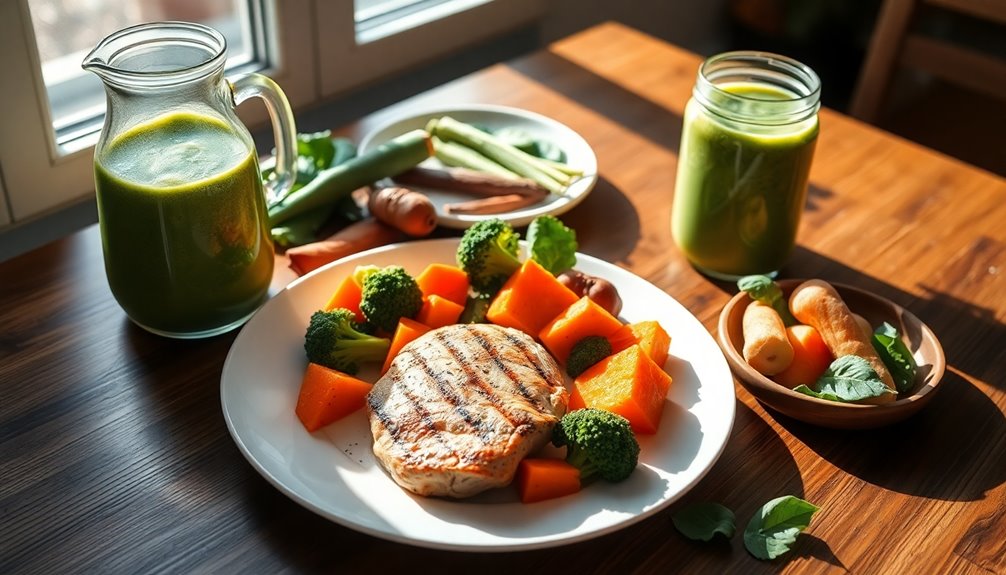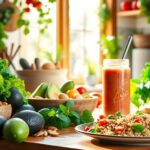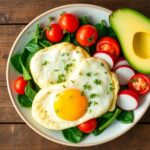A successful bodybuilding diet emphasizes balanced macronutrients to fuel your workouts and aid recovery. You'll want to prioritize protein from sources like lean meats and dairy to support muscle growth. Carbs from whole grains and fruits are essential for energy, particularly during intense training. Don't forget healthy fats, which help with hormone production and overall health. Timing your meals, especially around workouts, can enhance muscle repair. Staying well-hydrated is vital too. By paying attention to these aspects and incorporating effective strategies, you'll see better results in your physique. There's plenty more to explore that can optimize your approach.
Key Takeaways
- Prioritize high-quality protein sources like lean meats, fish, and dairy to support muscle repair and growth.
- Incorporate complex carbohydrates from whole grains, fruits, and vegetables for sustained energy during workouts.
- Include healthy fats such as avocados and nuts to support hormone production and overall health.
- Pay attention to nutrient timing, particularly post-workout, for optimal recovery and muscle synthesis.
- Consider supplements like protein powder and creatine to enhance performance when combined with a balanced diet.
Understanding Macronutrients
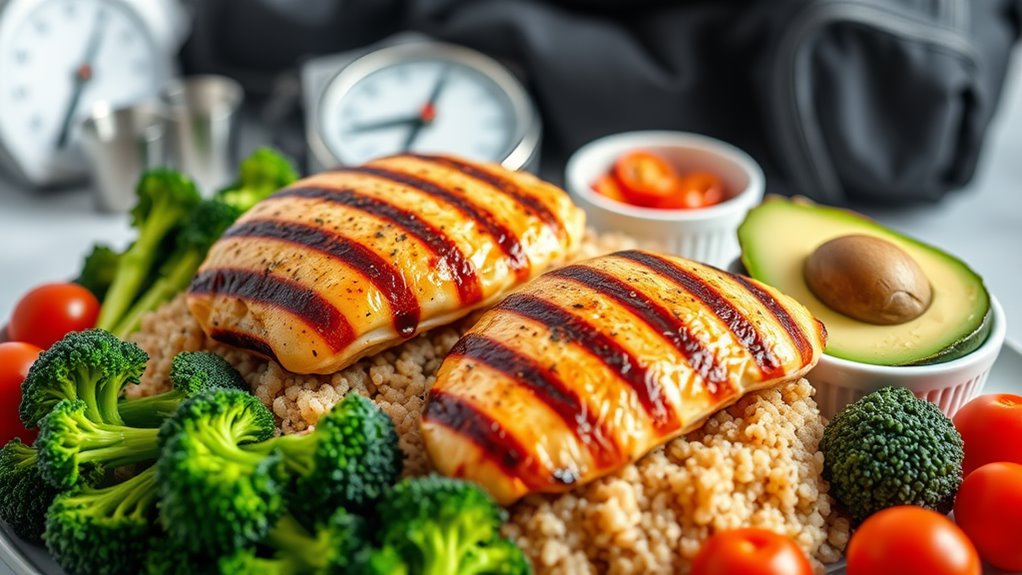
When you start on a bodybuilding journey, understanding macronutrients is crucial, as these nutrients fuel your workouts and recovery. You'll quickly realize that it's not just about lifting weights; it's also about what you put into your body. Your caloric intake plays a pivotal role in your progress, so you need to be aware of how many calories you're consuming each day. This understanding will help you achieve your goals, whether that's bulking up or trimming down.
Macronutrients are divided into three main categories: carbohydrates, proteins, and fats. Each of these plays a significant role in your overall fitness. To maximize your gains, you'll want to find the right nutrient ratios that work for you. While there's no one-size-fits-all approach, a common starting point is to aim for a balanced mix of these macronutrients.
For example, you might try consuming 40% carbohydrates, 30% protein, and 30% fats. Additionally, incorporating whole-food sources of protein into your diet can enhance muscle recovery and growth.
As you experiment with different ratios, pay attention to how your body responds. You'll discover what fuels your workouts best and aids in your recovery. Remember, it's a journey, and finding what works for you is part of it. Connect with others in the bodybuilding community; share your experiences and learn from each other. You're not alone in this, and together, you can navigate the world of macronutrients, making informed choices that lead to success on your bodybuilding path.
Importance of Protein
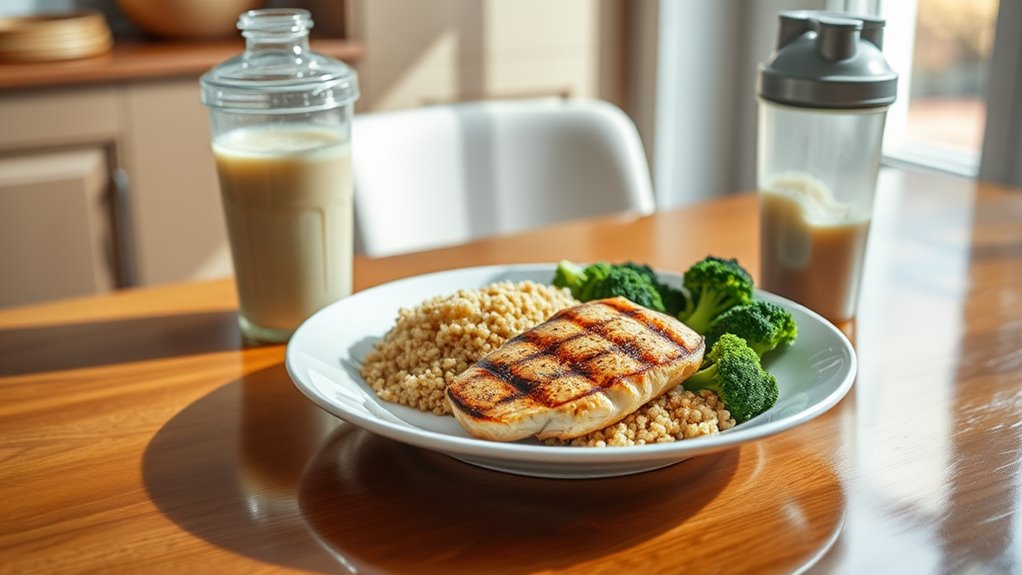
Recognizing protein's vital role in bodybuilding is essential for anyone looking to build muscle and enhance recovery. When you're pushing your limits in the gym, protein is your best ally. It helps repair and grow muscle fibers, which is necessary for achieving the physique you desire.
Choosing quality protein sources can make a notable difference in your progress. Lean meats, fish, dairy, eggs, and plant-based options like lentils and chickpeas are all excellent choices. By including a variety of these sources in your diet, you'll ensure you're getting all the necessary amino acids your body needs.
But it's not just about how much protein you consume; it's also about when you consume it. Protein intake timing plays an essential role in maximizing your gains. Aim to spread your protein consumption throughout the day, especially around your workouts. Additionally, focusing on strengthening your glutes can significantly enhance your overall performance and muscle development.
Consuming protein within 30 minutes post-workout can greatly improve recovery and muscle synthesis.
Don't forget to listen to your body and adjust your protein intake based on your training intensity and goals. Whether you're just starting or you're a seasoned lifter, keeping your protein levels in check will help you feel more energized and motivated. Remember, you're not alone on this journey. By prioritizing protein, you'll be setting yourself up for success and becoming part of a supportive community working towards the same goals. Keep pushing forward, and you'll see the results you're pursuing!
Carbohydrates for Energy
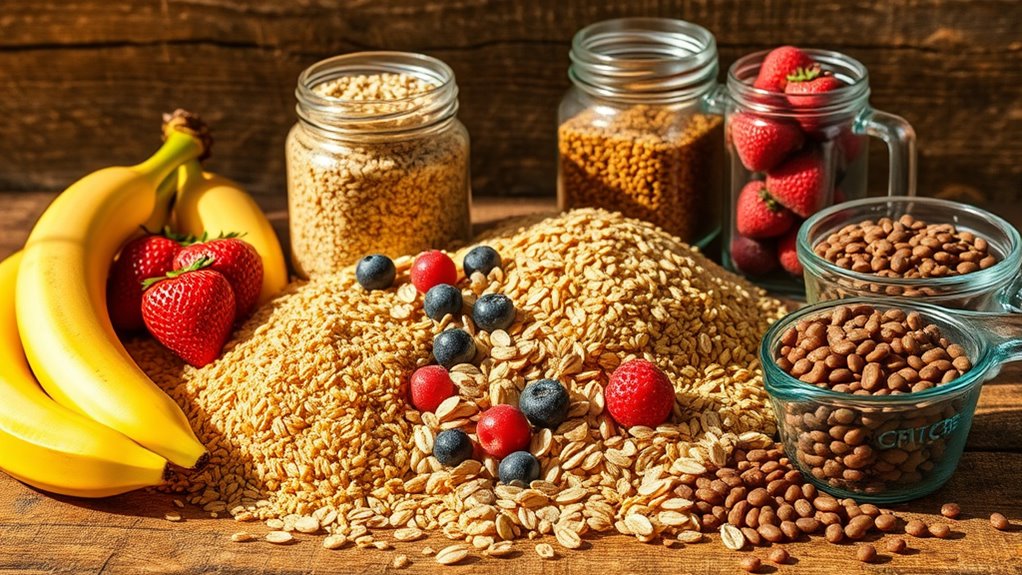
While protein is necessary for muscle repair and growth, carbohydrates play a key role in fueling your workouts and overall performance. Carbs are your body's primary energy source, especially during intense training sessions. When you consume carbohydrates, your body converts them into glucose, which gets stored as glycogen in your muscles and liver. This glycogen is crucial for maintaining your energy levels, enabling you to push through those last few reps.
To maximize your energy and results, consider incorporating carb cycling into your routine. This strategy involves alternating between high-carb and low-carb days, allowing you to tailor your intake based on your training intensity. On days when you're hitting the weights hard, increase your carb intake for optimal glycogen replenishment. On rest days, you can cut back, allowing your body to utilize stored energy more effectively.
Don't underestimate the power of good carbs—think whole grains, fruits, and vegetables. They not only provide the energy you need but also offer essential nutrients for recovery. By fueling your body with the right carbohydrates, you'll feel more energized and focused during workouts, helping you achieve your bodybuilding goals. Additionally, maintaining your energy levels through proper nutrition will ensure you can experience the satisfaction of creating hair-splitting edges in your performance, just as one would in the art of hand sharpening.
Healthy Fats in Your Diet
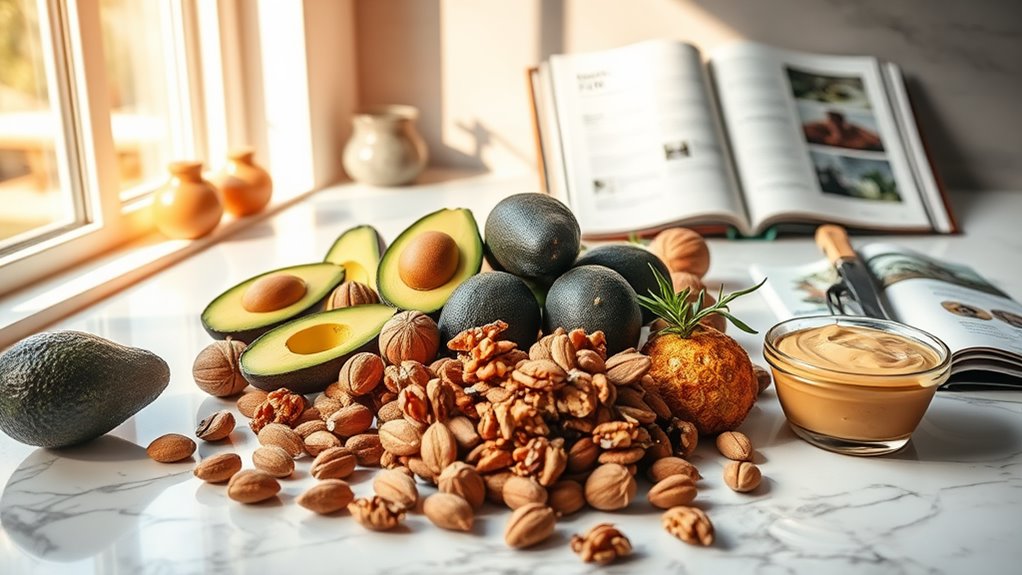
Incorporating healthy fats into your bodybuilding diet is essential for overall health and performance. These fats not only provide energy but also support hormone production, cell health, and nutrient absorption. By choosing the right fats, you can enhance your workouts and recovery. Additionally, following a program like Half Day Keto can help optimize your fat-burning potential.
Here's a quick breakdown of some excellent sources of healthy fats:
| Food | Benefits | Suggested Use |
|---|---|---|
| Avocados | Rich in monounsaturated fats, fiber, and potassium, which help with muscle recovery and hydration. | Add to smoothies or salads. |
| Omega 3 Sources | Found in fatty fish, flaxseeds, and walnuts; they reduce inflammation and support joint health. | Include in meal prep or snacks. |
| Nut Butter | Provides protein and healthy fats; options like almond or peanut butter are tasty and versatile. | Spread on whole grain toast or mix into oatmeal. |
| Coconut Oil | Contains medium-chain triglycerides (MCTs) that may boost energy and metabolism. | Use for cooking or in smoothies. |
| Olive Oil | Packed with antioxidants and anti-inflammatory properties; perfect for heart health. | Drizzle over salads or veggies.
Meal Timing Strategies
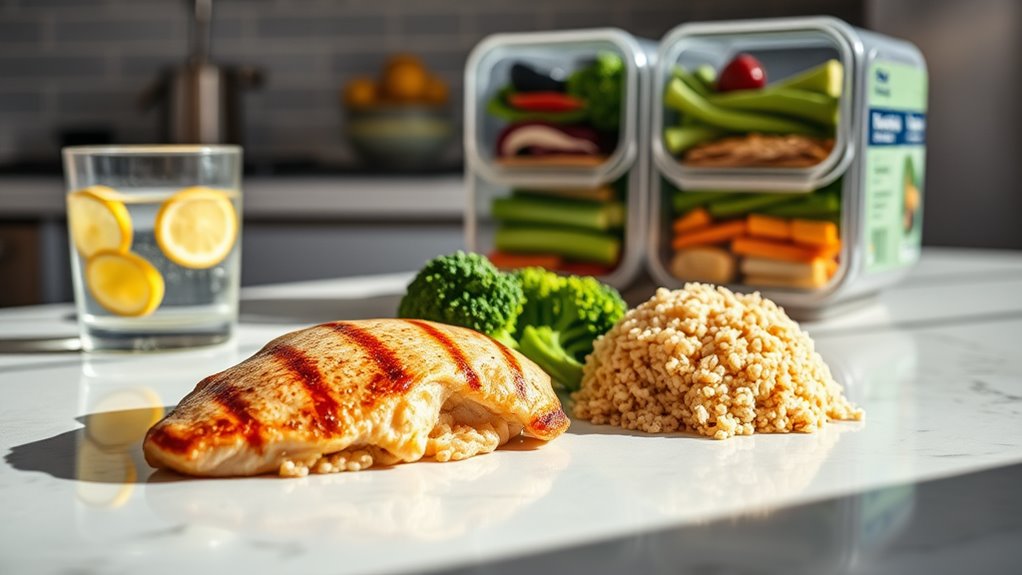
Meal timing plays a significant role in maximizing your bodybuilding results. You might've heard about nutrient timing, which emphasizes when you consume your meals to support muscle growth and recovery. By strategically planning your meals, you can enhance your performance and reach your goals more effectively.
One effective approach is to focus on meal frequency. Instead of sticking to three large meals a day, consider eating five to six smaller meals. This helps keep your metabolism active and provides a steady stream of nutrients to your muscles. By doing so, you'll create a more anabolic environment conducive to muscle growth.
Don't overlook the fasting benefits either. Short periods of fasting can enhance your body's ability to utilize fat as fuel and improve insulin sensitivity, making your body more efficient at processing nutrients when you do eat. This doesn't mean you should skip meals, but rather that you can experiment with intermittent fasting to see if it works for you.
Also, prioritize your post-workout nutrition. The window following your workout is essential for recovery, so make sure to consume a meal rich in protein and carbohydrates within that time frame. This helps replenish glycogen stores and kickstarts muscle repair. Additionally, incorporating Keto recipes into your meal plan can provide you with nutrient-dense options that support muscle growth while keeping your carbohydrate intake in check.
In the end, finding the right meal timing strategies tailored to your lifestyle can make a notable difference. Listen to your body, experiment with different approaches, and you'll likely discover what best supports your bodybuilding journey. You're not alone in this; we're all in it together!
Pre-Workout Nutrition
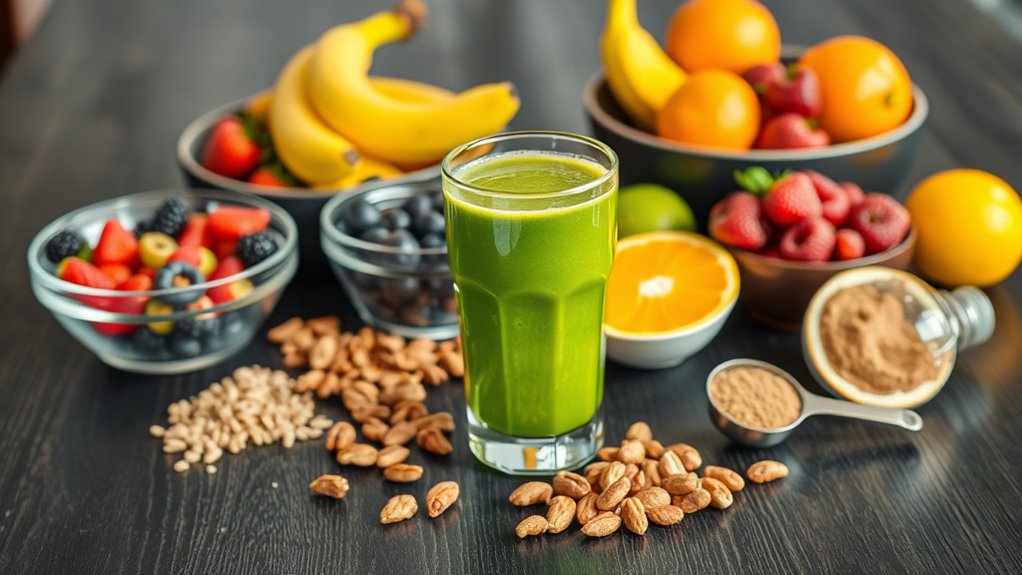
Fueling your body with the right pre-exercise nutrition is necessary for optimizing performance and maximizing gains. By selecting the appropriate pre-workout snacks, you can make sure you've got the energy boost you need to crush your workout. Timing meals is crucial here, as it can greatly impact your performance enhancement.
Aim to eat a well-rounded meal or snack about 30 minutes to 1 hour before heading to the gym. This gives your body ample time to digest and convert food into energy. A combination of carbohydrates and protein is ideal, as carbs offer quick energy while protein aids in muscle repair. Incorporating smoothies into your routine can also provide rapid body fat elimination while fueling your workouts effectively.
Here's a useful table to assist you in choosing the perfect pre-workout snack:
| Snack Idea | Benefits | Ideal Timing |
|---|---|---|
| Banana with Almond Butter | Rapid energy boost, healthy fats | 30-45 minutes before |
| Greek Yogurt with Berries | Protein-packed, antioxidants | 1 hour before |
| Oatmeal with Honey | Sustained energy, carbs | 1 hour before |
| Rice Cakes with Peanut Butter | Low-calorie, easy to digest | 30-45 minutes before
Post-Workout Recovery Foods
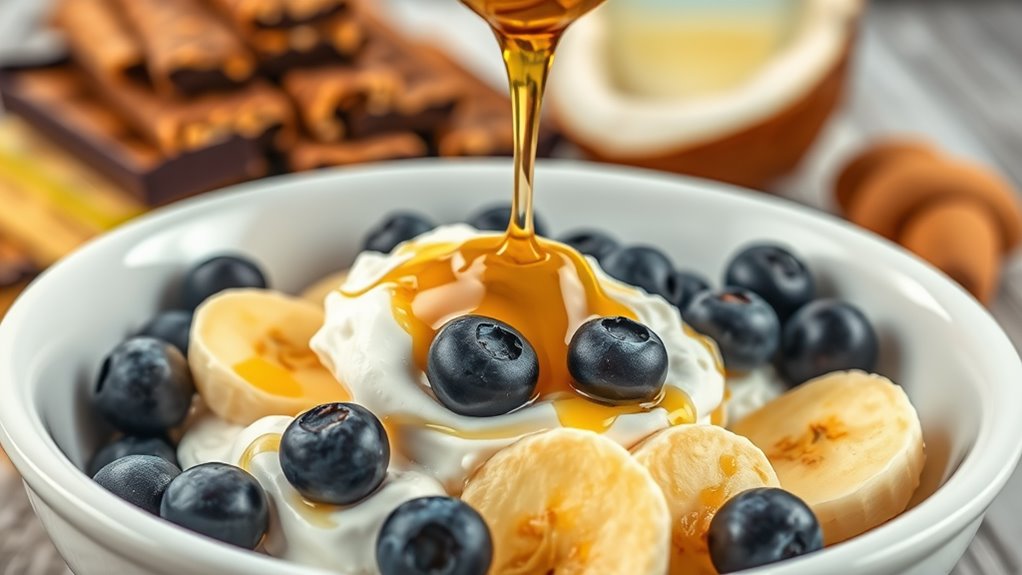
After pushing your limits in the gym, it's important to focus on recovery nutrition to help your muscles repair and replenish energy stores. The right post-workout foods can make a significant difference in your overall progress. By paying attention to nutrient timing, you're setting yourself up for success. Ideally, you want to consume your recovery meal within 30 to 60 minutes after your workout, ensuring your body gets what it needs right when it's most important.
Aim for a combination of protein and carbohydrates. Protein is vital for muscle repair, as it provides the building blocks your body needs to recover and grow stronger. Delicious options like grilled chicken, Greek yogurt, or a protein shake can do wonders. Pairing these with a source of carbs, such as brown rice, sweet potatoes, or fruits, will replenish glycogen stores that get depleted during your workout.
Don't forget about healthy fats, too! A sprinkle of nuts or a drizzle of olive oil can enhance your meal and help with inflammation. Additionally, incorporating a diet rich in delicious recipes can further support your recovery and enhance your overall fitness journey.
Hydration and Muscle Growth
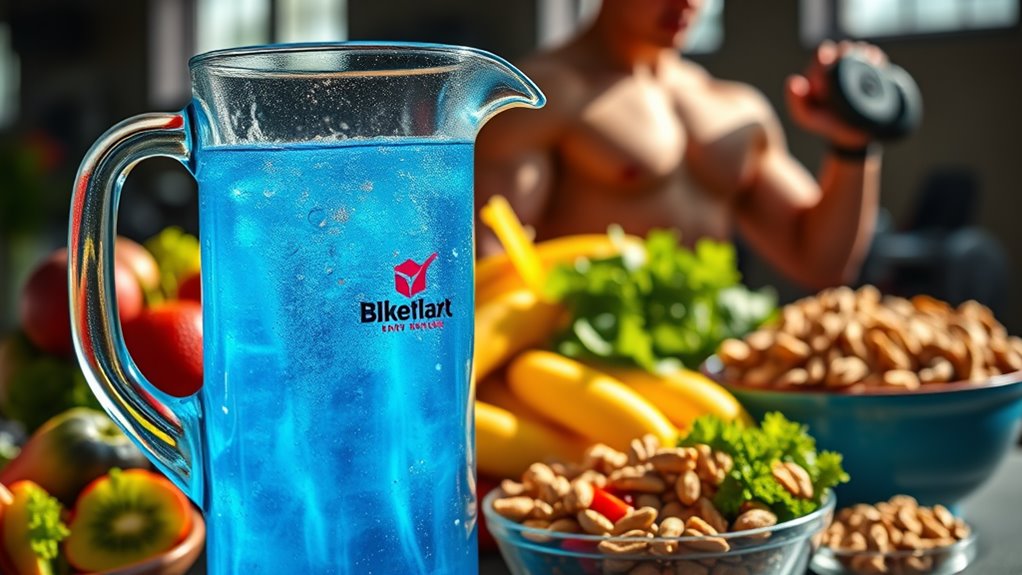
Proper hydration plays an integral role in muscle growth and recovery. When you're pushing your limits in the gym, your body needs adequate water intake to perform at its best. Dehydration can hinder your strength, endurance, and overall workout performance, so staying on top of your hydration game is pivotal.
Not only does water help transport nutrients to your muscles, but it also aids in maintaining electrolyte balance, which is essential for muscle function. Electrolytes like sodium, potassium, and magnesium help regulate muscle contractions and prevent cramps. So, when you're sweating it out during your workouts, you need to replenish those electrolytes along with your water intake to keep everything in check.
Aim for at least half your body weight in ounces of water each day, adjusting based on your activity level and the climate. If you're lifting heavy or spending extra time in the gym, you may need more. Consider adding electrolyte-rich drinks, especially after intense sessions, to help restore that balance.
Incorporating proper hydration habits can elevate your performance and accelerate muscle growth. When you're well-hydrated, you'll notice improved energy levels, enhanced recovery, and even better results from your training. Additionally, mini band workouts can provide a unique challenge for muscle tightening and toning, complementing your hydration routine. Remember, you're not just part of a bodybuilding journey; you're part of a community that values growth, support, and the pursuit of excellence. Prioritize hydration, and you'll feel the difference in your gains.
Sample Meal Plans
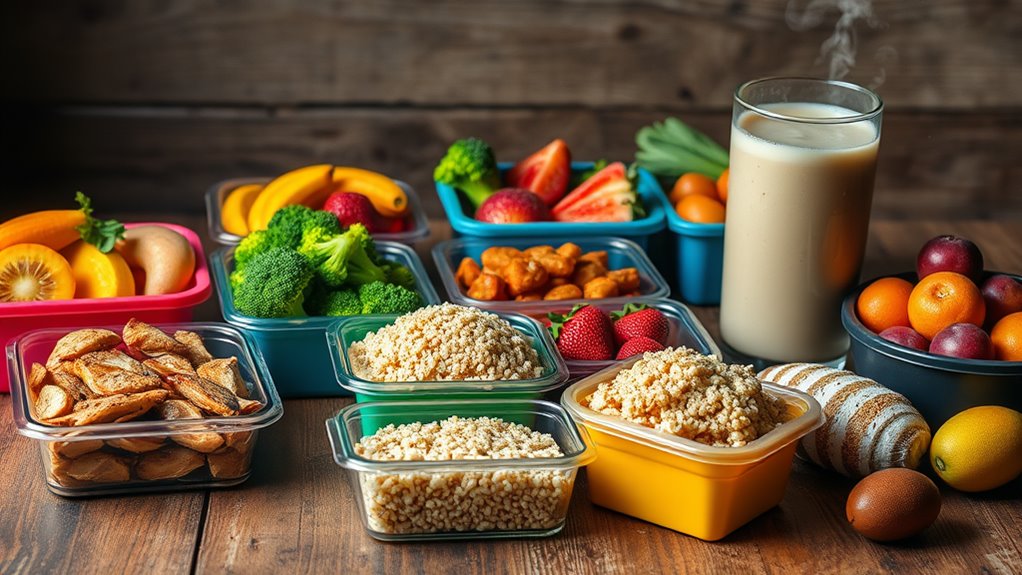
Staying hydrated sets the stage for your nutrition, and having a solid meal plan is just as important for optimizing your bodybuilding efforts. With the right sample meal plans, you can fuel your workouts and support your muscle growth. You'll want to focus on whole foods, lean proteins, healthy fats, and plenty of carbs to keep your energy levels up.
Start your day with a hearty breakfast, like scrambled eggs with spinach and whole-grain toast, along with a side of fruit. For lunch, consider grilled chicken breast with quinoa and roasted vegetables. This meal packs a protein punch and provides essential nutrients.
When it comes to dinner, think about salmon with sweet potatoes and a side salad—delicious and nutritious!
Don't forget about snacks! Keeping protein-rich snacks on hand, like Greek yogurt or mixed nuts, can help you stay on track between meals.
Grocery shopping for these ingredients might seem challenging at first, but once you get the hang of it, you'll feel more confident. Make a list based on your meal plans to streamline your shopping trips and avoid impulse buys.
Meal prep is your best friend in this journey. Spend a few hours each week prepping your meals so you can grab and go. This not only saves time but also guarantees you stick to your plan and resist the temptation of unhealthy options. Embrace the process, and you'll find yourself thriving in your bodybuilding journey with a supportive community cheering you on! Additionally, incorporating plant-based recipes can enhance your nutrition while supporting muscle recovery and overall health.
Supplements for Bodybuilders
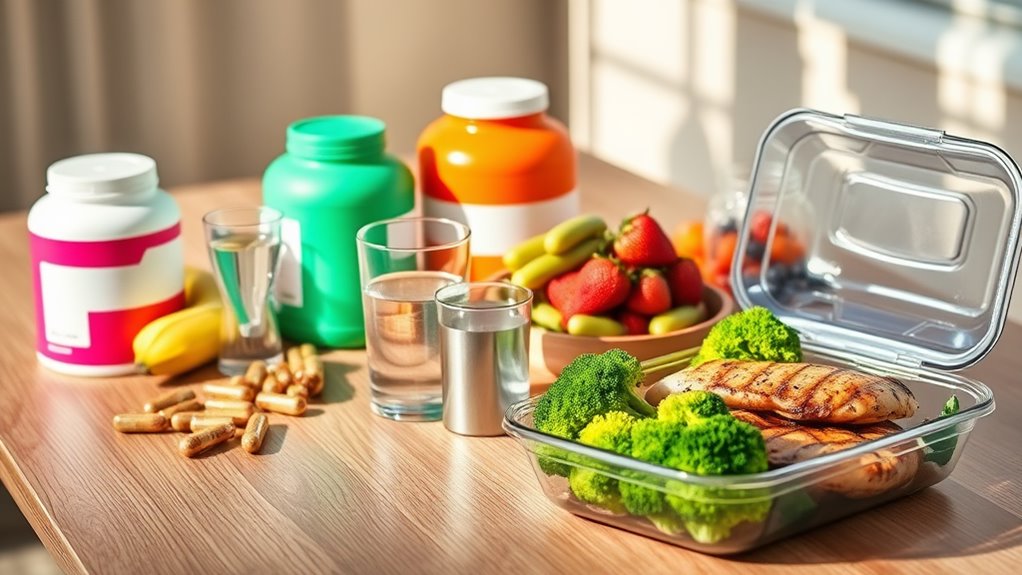
Exploring the world of supplements can be overwhelming, but they can play an important role in enhancing your bodybuilding efforts. With so many options available, it's pivotal to navigate through them wisely. Start with the basics: protein powder, creatine, and branched-chain amino acids (BCAAs). These are some of the most common supplement recommendations, designed to support muscle growth and recovery.
When you're diving into supplementation, don't forget about nutrient timing. This concept focuses on when you consume these supplements to maximize their benefits. For instance, taking protein right after your workout can greatly aid in muscle recovery.
Similarly, creatine is most effective when taken close to your workout time, as it helps to replenish your energy stores.
It's also a good idea to combine supplements with a well-structured diet. Make sure you're consuming enough whole foods to fuel your workouts, but think of supplements as an added boost. They can fill in the gaps when you're in a pinch or need that extra edge, but they shouldn't replace real food. Additionally, understanding your calorie intake is essential to ensure that your supplementation aligns with your overall dietary goals for effective weight management.
Frequently Asked Questions
Can I Build Muscle on a Vegetarian or Vegan Diet?
Yes, you can definitely build muscle on a vegetarian or vegan diet! You just need to focus on diverse protein sources like lentils, chickpeas, quinoa, and tofu. These options can help you meet your protein needs.
However, keep an eye out for potential nutrient deficiencies, especially in vitamin B12 and iron. By planning your meals carefully and including a variety of foods, you'll thrive and feel a strong sense of community with others on the same journey.
How Do I Calculate My Daily Calorie Needs for Bodybuilding?
Calculating your daily calorie needs for bodybuilding is like fine-tuning an engine for peak performance. Start by figuring out your Basal Metabolic Rate (BMR) using an online calculator.
Then, take into account your activity level for total daily energy expenditure (TDEE).
From there, you can delve into macro tracking and meal planning to make sure you're fueling your body right.
It's all about finding that balance and feeling part of a supportive community on your journey!
What Are Common Mistakes in a Bodybuilding Diet?
When it comes to your diet, it's easy to make common mistakes. You might overlook meal timing, thinking it doesn't matter, but it can really impact your energy levels and recovery.
Also, if you're not paying attention to macronutrient balance, you could be missing out on essential nutrients. Focus on regular meals and a good mix of proteins, carbs, and fats to truly support your fitness goals and feel your best.
Is Intermittent Fasting Effective for Muscle Gain?
Intermittent fasting can be effective for muscle gain, especially if you focus on the right eating windows. You'll enjoy fasting benefits like improved insulin sensitivity and enhanced fat loss, which can help you maintain muscle preservation. Just make sure you're hitting your protein goals during eating periods.
If you find a routine that works for you, it can be a great way to build strength while enjoying a sense of community with others on similar journeys.
How Do I Deal With Cravings While Dieting?
Dealing with cravings while dieting can be tough, but you can make it easier. Try practicing mindful eating; focus on what you're eating and savor each bite. This helps you recognize when you're truly hungry versus just craving something.
Also, consider food substitutions that satisfy your cravings without derailing your progress. For example, swap chips for air-popped popcorn or fruit. You'll find a balance that keeps you feeling good and connected to your goals.
Conclusion
So, you've mastered the art of lifting weights but thought you could skip the diet? Ironically, those muscles won't grow on wishful thinking alone. Embracing macronutrients, timing your meals, and staying hydrated isn't just for the health nuts; it's your secret weapon too. With the right fuel, you'll not only lift more but also feel unstoppable. Who knew that a little planning in the kitchen could lead to such massive gains at the gym? Now, go eat!

